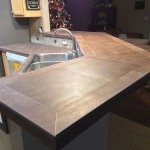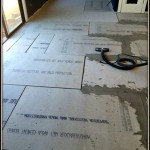Can You Put Tile In The Garage?
Garages often transition from simple parking spaces to multifaceted areas for storage, workshops, and even recreational activities. This shift in function raises questions about appropriate flooring. While concrete is the standard, many homeowners consider tile for its aesthetic and functional advantages. This article explores the feasibility and considerations of installing tile in a garage.
Tile offers several benefits in a garage setting. Its durability makes it resistant to chipping, cracking, and staining, especially from automotive fluids like oil and gasoline. The wide variety of available tile styles, colors, and patterns allows homeowners to create a visually appealing space that complements the home's overall design. Furthermore, tile is easy to clean and maintain, requiring minimal effort to keep it looking pristine.
However, several crucial factors must be considered before installing tile in a garage. The primary concern is the susceptibility of tile to cracking under the weight and pressure of vehicles. Standard ceramic and porcelain tiles, while durable, are not designed to withstand the concentrated weight of a car or truck. Over time, this pressure can cause the tiles to crack or the grout to fail, leading to costly repairs.
Another critical consideration is the garage's climate. In regions experiencing freezing temperatures, moisture can seep into the porous grout lines and freeze. This expansion and contraction cycle weakens the grout and can eventually cause the tiles to loosen or crack. This issue is further exacerbated if the garage is not properly insulated or heated.
The condition of the existing concrete slab also plays a vital role in the success of a tile installation. Cracks, uneven surfaces, or excessive moisture in the concrete can compromise the tile's adhesion and lead to premature failure. Proper preparation of the concrete surface is essential to ensure a stable and long-lasting tile installation.
If, after considering these factors, tile remains a desired flooring option, certain steps can mitigate potential problems. Choosing a tile specifically designed for high-traffic areas or industrial applications is crucial. These tiles are typically thicker and more durable than standard residential tiles and can better withstand the weight and pressure of vehicles.
Employing a high-quality, flexible grout and sealant is also essential. Flexible grout allows for slight movement and expansion, reducing the risk of cracking due to temperature fluctuations or weight pressure. Sealant further protects the grout and tiles from moisture penetration and staining.
Proper surface preparation is paramount to a successful tile installation. Any existing cracks in the concrete slab should be repaired, and the surface should be level and free of debris. Applying a primer designed for concrete before laying the tile enhances adhesion and helps prevent moisture issues.
An alternative approach involves installing a subfloor over the existing concrete slab before laying the tile. This can provide a more stable and level surface, particularly in garages with uneven or cracked concrete. Options for subflooring include cement backer board, plywood, or specialized underlayment systems designed for tile installations.
Another factor influencing the success of garage tile installation is the installation process itself. Hiring a professional tile installer experienced in garage applications is highly recommended. They possess the expertise to assess the specific conditions of the garage and recommend appropriate tile types, installation methods, and materials.
Exploring alternative flooring options designed specifically for garages is advisable. Epoxy coatings, for instance, provide a seamless, durable, and stain-resistant surface capable of withstanding the rigors of a garage environment. Interlocking rubber or PVC tiles offer another alternative, providing a cushioned, slip-resistant surface that is easy to install and maintain.
Regular maintenance is essential to prolong the lifespan of any garage flooring, including tile. Sweeping or vacuuming regularly removes dirt and debris that can scratch the tile surface. Periodically mopping with a mild detergent and water keeps the tiles clean and removes any stains. Reapplying sealant to the grout lines every few years helps prevent moisture penetration and maintains the integrity of the installation.
Ultimately, the decision of whether or not to install tile in a garage requires careful consideration of various factors, including the garage's climate, usage, and the condition of the existing concrete slab. While tile offers aesthetic and functional advantages, it is essential to acknowledge the potential challenges and take appropriate measures to mitigate them. Exploring alternative flooring options designed for garage environments may also provide suitable solutions.

Porcelain Tile The Ideal Surface For Garage Flooring Vault Custom Design

Installing Garage Floor Tiles Step By Rubi Blog Usa

Best Garage Floor Tiles For 2024 Cnet

Garage Flooring 7 Best Floor Ideas For Your

How I Upgraded My Garage Floor Huge Difference

How To Ensure Your Tiled Garage Floor Can Last A Lifetime Vault Custom Design

How To Tile A Garage Floor The Money Pit

Is Porcelain Tile Good For Garage Floors In Westford Ma S R Carpet

Garage Floor Tile Options A Guide From Plastic To Porcelain All Floors

How To Install Interlocking Garage Floor Tiles Modutile Full Explanation
Related Posts








